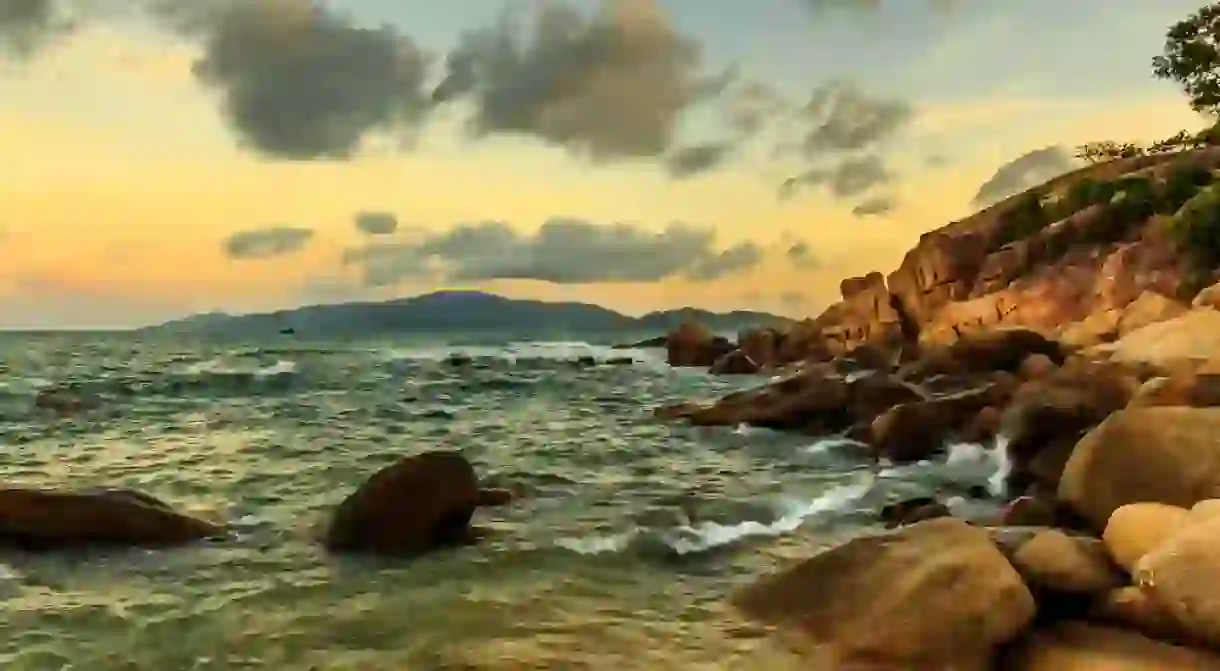11 Beautiful Creatures Found in Vietnam's Oceans

With the attention paid to Vietnam’s vibrant cities, towering karst peaks, and picturesque rice paddies, it can be easy to forget that the nation has over 2,000 miles of coastline. From the islands of the south to the limestone lagoons of the north, these are the most incredible creatures found in Vietnam’s balmy seas.
Phu Quoc’s horned sea star
This odd spiked variety of starfish can be found throughout the shallows of Vietnam’s tropical seas. The black thorns protruding upward are used to scare off predators and startle tourists. However, they can cause no real harm. For your best shot to see one or many of these beautiful creatures, head to Phu Quoc and find the aptly named Starfish Beach.

Whale sharks of Nha Trang
Reaching lengths of over 40 feet and weights of more than 20 tons, the whale shark is one of the largest creatures in the sea. This gentle giant flocks to harbors and bays north of Nha Trang each spring to feast on the plankton and krill that habitually trap themselves between the islets.

Ambling ocean sunfish
The ocean sunfish or Mola mola can reach weights of over 2,000 pounds. The slow-moving giant has been caught all along Vietnam’s winding coastline, most notably in 2016 when a massive two-meter specimen found its way into a fishing net along the warm waters of the central coast. Not for eating, the endangered ocean giant was donated to Vietnam’s National Museum of Nature for further research.

Hunted hawksbill turtle
This critically endangered species is one of the five varieties of sea turtles found along Vietnam’s stretching coastline. The hawksbill can most often be spotted throughout the clear waters near Nha Trang. However, in recent years populations have declined significantly due to illegal fishing of the species. Police have uncovered smuggling operations throughout the nation that have left thousands of turtles dead.

Japanese flying squid
This spectacular squid can often be spotted in large groups off much of Vietnam’s coast. When they feel the presence of danger, the two-finned creatures forcefully expel water, creating a propulsion system capable of launching it nearly 100 feet clear across the sea to new-found safety.

Pinecone fish of the reefs
Found along Vietnam’s increasingly scarce coral reefs, the pinecone fish is one of the more interesting-looking additions to our list. A repeating pattern of thick, armored, yellow scales bordered by black runs the foot-long length of the body. At night, a bio-luminescent organ in the lower jaw produces a blue-green color.

Con Dao’s green sea turtle
The remote and undeveloped islands of Con Dao are home to the largest turtle populations in Vietnam, including the green sea turtle. Between the months of May and October, hundreds of turtles crawl to the sandy, isolated beaches to lay their eggs. For your best opportunity to get a glimpse, head to Con Son Island and arrange a tour with Con Dao Turtle Tour through the national park’s office.

Finless porpoise in Ha Long Bay
Sometimes spotted in Vietnam’s iconic Ha Long Bay, this mammal is the only member of its family lacking a dorsal fin. As the fishing industries in Vietnam and other Southeast Asian nations have ballooned, the population of this smiling species has rapidly declined and today is very much at risk of being wiped out.

Spinner dolphins
Capable of surviving in brackish fresh and salt water, the Spinner Dolphin is an incredibly rare sight in Vietnam. Those lucky enough to spot a pod of the social mammals may be tipped off by the spectacular sight of the dolphins leaping through the air.

Dugongs of the shallows
This amiable cousin of the Manatee can sometimes be spotted in the seas off of Phu Quoc or the shallows surrounding the Con Dao archipelago. The nation’s southernmost island has been home to the Dugong Festival to raise awareness of the endangered species prone to drowning in fishing nets.

Dangerous lionfish
Beautiful and as unfriendly as they get. If you spot one of the many lionfish drifting lazily through Vietnam’s tropical waters, be sure to keep your distance. This fascinating barbed fish may not look like danger, but it packs an extraordinarily painful punch, causing anything from vomiting and fever to paralysis of the limbs for those who come in contact with it.














